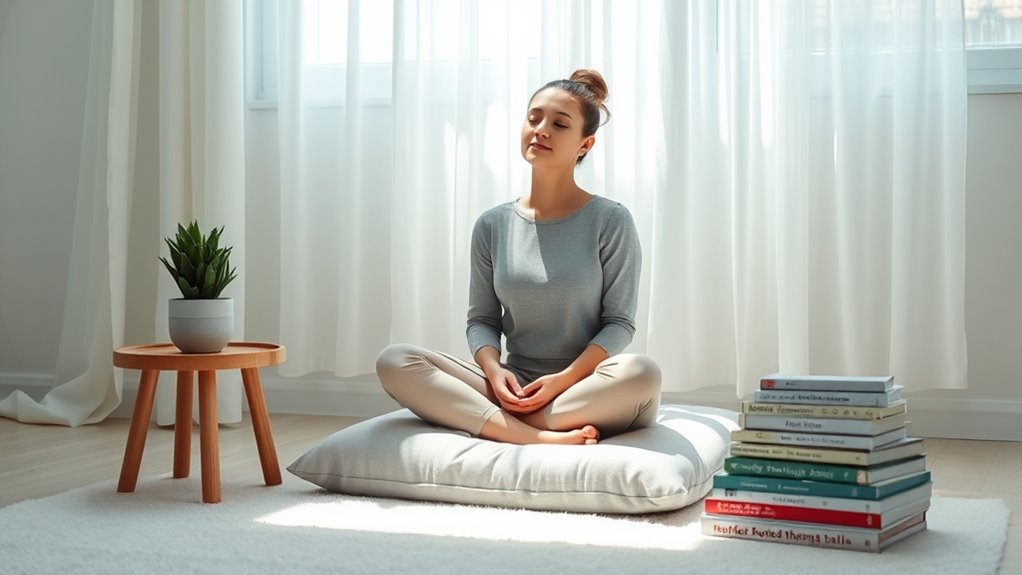Prioritizing your mental health is essential for a balanced life. Mindfulness practices, like focused breathing or meditation, help you stay present and manage stress effectively. Meanwhile, exploring therapy options, such as talk therapy or online counseling, offers valuable support for coping and self-understanding. Combining these approaches boosts resilience and nurtures emotional well-being. If you want to discover more ways to strengthen your mental health, there’s a lot to explore that can truly make a difference.
Key Takeaways
- Mindfulness practices help manage stress, improve mental clarity, and foster emotional awareness for overall well-being.
- Therapy options like CBT and online counseling provide accessible, diverse ways to address mental health concerns proactively.
- Incorporating self-care routines and therapy reduces stigma and encourages individuals to seek support without shame.
- Routine mental health care builds resilience, prevents issues from worsening, and supports long-term emotional stability.
- Open conversations and stigma reduction create supportive environments, enhancing mental health outcomes and community well-being.

Have you ever stopped to contemplate how much your mental health impacts every part of your life? It influences your relationships, work performance, and overall sense of well-being. Taking care of your mental health isn’t just about avoiding illness; it’s about actively nurturing your mind, just like you do your body. Developing effective self care routines can make a significant difference. Simple practices like daily mindfulness, journaling, or taking time for activities you enjoy help you stay grounded and manage stress more effectively. These routines serve as proactive steps to maintain mental resilience, preventing issues from escalating. But beyond personal habits, it’s essential to recognize the societal barriers that hinder mental health care, particularly stigma. The stigma reduction surrounding mental health issues encourages openness and makes it easier for you to seek help when needed. When mental health isn’t stigmatized, you feel less shame or fear about discussing your struggles, which opens doors to support and therapy options that can truly transform your life. Additionally, understanding the Relationships – Personality Test can offer insights into how your mental health affects your interactions and personal growth.
Engaging in mindfulness practices allows you to stay present and aware of your thoughts and emotions without judgment. This awareness can help you catch early signs of anxiety or depression, giving you the chance to address them before they become overwhelming. Mindfulness isn’t about erasing negative feelings but about observing them with compassion, which fosters a healthier relationship with your mental state. Incorporating mindfulness into your daily routine can be simple—just a few minutes of focused breathing or meditation can create a calming effect and improve your overall mental clarity.
When it comes to therapy options, knowing there are various approaches can make seeking help less intimidating. Whether it’s traditional talk therapy, cognitive-behavioral therapy (CBT), or newer modalities like online counseling, you have choices suited to your needs and comfort level. Therapy isn’t a sign of weakness; it’s a proactive step toward understanding yourself better and developing coping strategies. Overcoming stigma and embracing therapy can be empowering, giving you tools to navigate life’s challenges more effectively. Combining mindfulness with professional support creates an all-encompassing approach to mental health that promotes self-awareness, resilience, and healing. Remember, prioritizing your mental health isn’t selfish—it’s essential. When you invest in yourself through self care routines and seek therapy without shame, you’re taking crucial steps toward a healthier, more balanced life.
Frequently Asked Questions
How Do I Find a Qualified Therapist in My Area?
To find a qualified therapist in your area, start by checking their credentials, like licensure and specialties. Use online directories such as Psychology Today or TherapyDen, filtering by location and expertise. Ask for recommendations from trusted friends or your support group. You can also contact local clinics or mental health organizations for verified therapists. Always confirm credentials and ask questions to ensure they’re the right fit for your needs.
Are Online Therapy Sessions as Effective as In-Person Ones?
Online therapy sessions, or virtual therapy, can be just as effective as in-person counseling for many people. It offers convenience, flexibility, and access to qualified therapists regardless of location. While some prefer face-to-face interactions for deeper connection, research shows that virtual therapy can provide comparable benefits. Ultimately, it depends on your preferences and needs, but many find virtual therapy a practical, effective alternative to in-person counseling.
What Is the Cost Range for Different Therapy Options?
Think of therapy options like a menu—there’s something for every budget. You can expect to pay anywhere from $50 to $250 per session, depending on the type and location. Therapy affordability varies, but mental health insurance can often cover part of the cost. Sliding scale fees are also common, making mental health support more accessible. Always check if your insurance includes mental health benefits to help ease expenses.
How Long Does It Typically Take to See Improvement?
You might start noticing therapy progress within a few weeks, but it varies based on your situation. With mindfulness, the timeline for improvements can range from a few sessions to several months. Consistency is key, so stick with your practice. Typically, many people see meaningful changes in their mental health after 8 to 12 weeks of regular therapy and mindfulness exercises, though some experience quicker or slower progress.
Can Mindfulness Alone Replace Traditional Therapy Methods?
Mindfulness techniques alone can’t fully replace traditional therapy methods, but they can be a valuable part of therapy integration. You might find mindfulness helps manage stress and increase self-awareness, yet professional therapy offers personalized support and deeper insight. Combining both approaches allows you to benefit from mindfulness practices while addressing complex issues with guidance from a trained therapist. This balanced strategy enhances your mental health journey effectively.
Conclusion
Taking care of your mental health is essential, and mindfulness alongside therapy offers practical support. You might think it’s too time-consuming or unnecessary, but imagine your mind as a garden: regular attention and care help your mental well-being flourish. Just like watering plants keeps them healthy, practicing mindfulness and seeking therapy nurture your mind. Prioritize your mental health today—your future self will thank you for the effort. It’s a small step toward a brighter, more balanced life.









